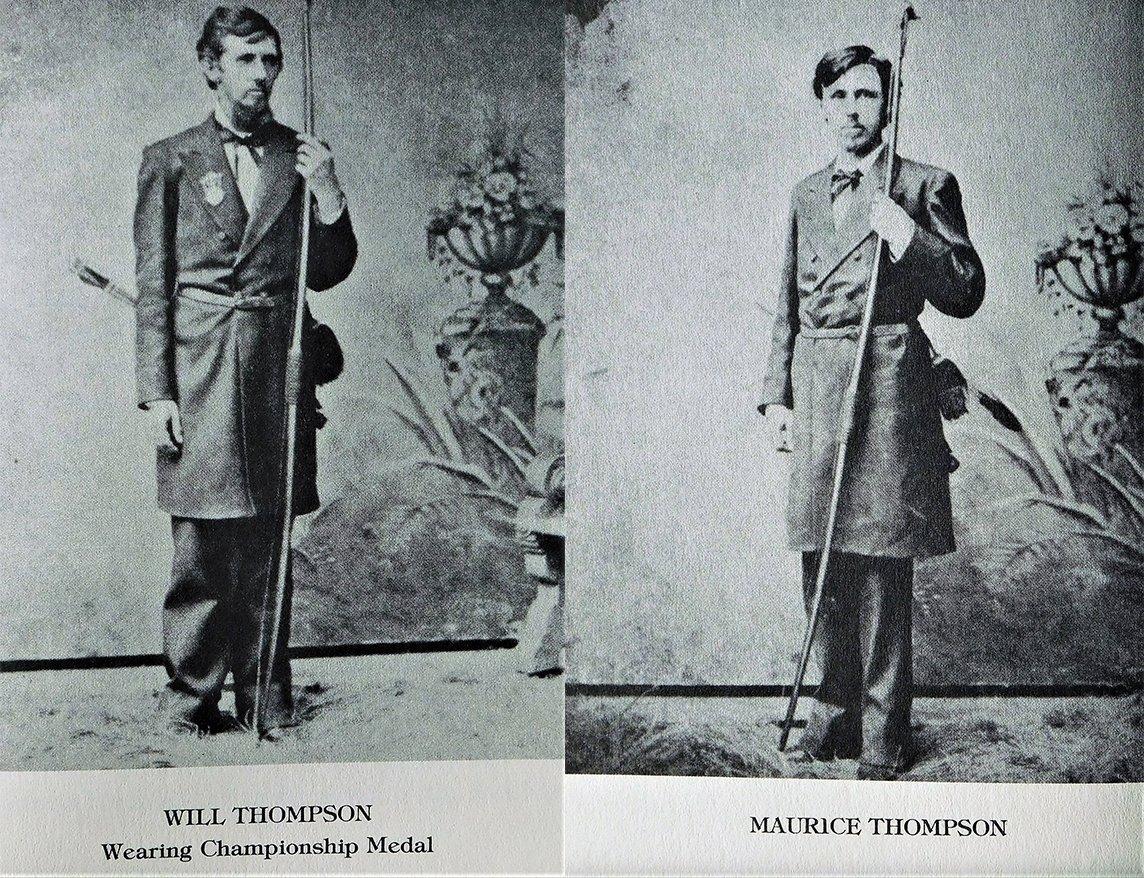Do You Know Who They Are?
Maurice and Will Thompson may be two of the most important people in archery that you've never heard of. They're not 3D champions or holders of the latest mega-racked world record, which seems to define our current batch of heroes. It's understandable how you might have missed them.
The Thompson's kept a sport alive that otherwise might have faltered. Through their writings, they conveyed a love of archery and hunting. Maurice's book, The Witchery of Archery, is perhaps the most well-known example of their work. Their dedicated efforts to grow the sport and establish local and national archery clubs helped a small sport grow.
It is with good reason that Will and Maurice Thompson have been hailed as the 'Patron Saints of American Archery', said M.R. James, founder of Bowhunter magazine. These brothers were our nation's first widely recognized bowhunters. Published accounts of their post-Civil War bow and arrow adventures in the Georgia wilds sparked the imagination of many magazine readers during the latter decades of the 19th century. And it was Maurice's 1878 classic, The Witchery of Archery that was the first important archery book to be published in America.
Their Early Years
Accounts of their early years are vague, but most have Maurice born in Indiana, then Will in Missouri. Best guesses put their age difference at five years, based on a reference Maurice makes in his book. From Missouri, the family moved to Kentucky, then arrived in Georgia around 1855.
Their father (and their grandfather) was a minister and operated a small plantation. The Thompson family farmed by trade but took to the outdoors by choice. They settled in north Georgia near Calhoun in Gordon County, where their father bought 160 acres to which he added more over time. It was during their time in Georgia the young Thompson brothers met Thomas Williams, who became their archery mentor.
The Sensei
Maurice describes Williams in his book as, an old hermit of a fellow, whose cabin stood in the midst of a vast pine forest that bordered my father's plantation in the beautiful hill country of northern Georgia.
Williams was an incomparable archer, and delighted in practicing with his favorite weapons: but a strange timidity so mastered him that no amount of pleading on our part could prevail on him to make any public exhibition of his skill.
These were great years, and both Maurice and Will would reflect fondly on them in their later writings.
Members of the Cherokee tribe still would have roamed the valley, and it's possible the brothers interacted with them. However, no accounts credit any of their archery experience to the Native Americans. The amount of game and available land to hunt would have provided the brothers plenty of chances to hone their craft and skills.
Bushnell G-Force DX ARC Rangefinder in Realtree Xtra
The War
Dark days came along with the year 1862, and Maurice enlisted with the Confederacy. His father and brother soon followed. Maurice served as a scout with the 63rd regiment of the Georgia volunteers. Seeing some action, Maurice suffered a few wounds but was able to overcome them. He surrendered with General Wofford's command at Kingstree, Georgia, in 1865.
With the war over, the Thompsons found their Georgia home in ruins. Without arms, since soldiers on the losing side had theirs confiscated, the brothers more or less returned to their roots with the bow and arrow. The climate, in many ways, was much better for former confederates in Florida and south Georgia, and that's where the brothers headed.
Lean Times
With few reasons left for staying in post-war Georgia, they once again strung their bows and hit the woods. While providing food, they found a reconnection that could have been lost. Florida at the time was game-rich and fertile. Maurice told of hunting from a boat in the swamp for such exotic game as ibis and herons.
The resourceful brothers even hired a group of local hunters he referred to as genuine hunters, by the way, who during the late Southern war, along with several others to avoid being forced into the military service had taken to the woods.
Apparently, the seven had a sailboat of their own design aptly named The Deserter. All of this took place on and near Lake Okeechobee, Florida, which was viewed by many as a liberal urban area not suited for hunting.
Life's Work
It was during these times that the brothers kept journals and sketched the wildlife they saw. Both were amateur scientists at heart and took their record keeping serious. In addition to their hunting narratives, both wrote other tales as well as poetry. Maurice eventually became a full-time writer in 1889, producing a best seller with Alice of Old Vincennes in 1900.
Maurice and Will enjoyed plenty of hunting adventures although their ideas of game to hunt were quite different than a modern bowhunter. Now, the whitetail is king, but in the days of the Thompson brothers almost any bird or animal was fair game. Maurice encouraged new archers to perfect their skill on woodpeckers stating, It is only by intelligent watchfulness and perseverance that perfect shooting is attained.
Latter Years
Eventually, both Maurice and Will moved back to Indiana to work for the railroad as engineers. Maurice also passed the bar exam and opened a successful law practice. They never gave up archery and worked to grow the sport.
According to M.R. James, Will and Maurice Thompson also were among a small group of archery enthusiasts who founded the National Archery Association in 1879, with Maurice later serving as the NAA's first president. Each eventually was enshrined in the Archery Hall of Fame. There can be no overstating the Thompson brothers' influence on modern archery and bowhunting. Their meaningful and lasting contributions to our sport continue to be felt to this very day.
Don't Miss: 5 Bows Under $700 for 2017
Editor's Note: This was originally published on July 3, 2008.
Are you a bowhunter thirsty for knowledge? Check out our stories, videos and hard-hitting how-to's on bowhunting.








